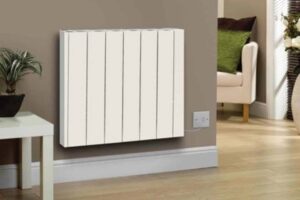Table of Contents
A boiler heat exchanger is a link between hot and cold fluids. It allows the hot one to exchange its heat with the chilly one without mixing them. This is far superior to simply dumping them together, such as combining hot and cold bathwater.
Imagine this gadget as a long, curling straw. Water for your heating system flows through this straw, while hot exhaust fumes from the burner tickle the exterior of the straw, warming the water as it passes.
What does a heat exchanger do?
Well, it primarily acts as an intermediary for heat. Its job is to transfer heat between objects like water and air while ensuring that they do not combine.
This is now used in residential boilers to heat water. Then it circulates that warm water throughout your home to make it cosy. In addition, some of it goes into your hot water tank for showers and kitchen use. These instruments are quite beneficial because they allow people to heat their homes more efficiently. This is essential for saving money on heating expenditures.
In the United Kingdom, all new boilers are required to be of the highest quality. They must have an “A” rating, which indicates they are at least 90% efficient. That’s like receiving an A+ in the heating class! What’s more, these high-rated boilers are better for the environment. So, you’re not only staying warm but also lowering your carbon footprint. Nice, right?
How does a boiler heat exchanger work?
Fundamentally, it serves as the heart of a condensing boiler. It’s similar to a special radiator, but instead of heating the air directly, it boils water. Here’s a quick explanation of how it works:
- Imagine a cold water pipe entering the boiler. The water you receive will be used to run your heating system.
- The heat exchanger heats up as the boiler’s burner ignites fuel, resulting in hot flames. These flames heat the exchanger itself.
- Heat transmission to water: This is adjacent to the cold water line. Even though they do not touch, the heat from the exchanger warms the water in the pipe.
- Hot water comes out of the boiler. This hot water then goes into your radiators or hot water tank.
What is the heat exchanger of a condensing boiler?
A condensing boiler heats water with hot gas. A heat exchanger helps to do this. When the gas becomes hotter, it rises. As it rises, it flows through a coiled pipe in the gadget. Cold water completely envelops the pipe. The hot gas gradually heats the water, which then goes to your radiators and taps.
Using a condensing boiler rather than a non-condensing one is now a legal requirement. Condensing boilers operate more efficiently. Non-condensing boilers contain only one exchanger. Viessmann boilers contain only one heat exchanger. Because of the increased surface area and central location of the burner in the stainless steel design, all heat may be removed in a single pass.
As water passes through your radiators, it cools. The boiler monitors its temperature. If it gets too cold, it returns to the exchanger for reheating. If it’s still hot enough, it circles the heating system again.
Types of heat exchanger
The tool comes in two main types. 
| Heat Exchanger Types | |
| Aluminium | Aluminium heat exchangers are lightweight, with good thermal conductivity and flexibility. They can be less expensive to install and are often smaller, to resist corrosion over the product’s lifespan. |
| Stainless steel | Stainless steel exchangers are picked for their reliability and high corrosion resistance, which results in a longer lifespan. The high chromium content improves the ability to resist corrosion but may compromise material durability. |
How to clean a boiler heat exchanger
Even if your boiler includes a stainless steel appliance, it may still require cleaning. Corroded radiator pipes might cause your system to clog with dirt and debris. If you detect cold spots on radiators or a completely clogged pipe, this is an indication.
Contact a certified heating engineer to clean the apparatus. You can schedule this as part of your annual boiler servicing. The engineer will identify the exchanger and use high-pressure water to clean up any dirt or debris. To maintain your boiler running efficiently for a longer period, repeat this process every 12 months.
Material Considerations
The material used for heat exchangers affects boiler efficiency and lifespan. Stainless steel, which resists corrosion, is essential for condensing boilers. Aluminium is lightweight and heat-efficient, which advantages boiler design and installation.
Faulty boiler heat exchanger symptoms
Check your boiler heat exchanger every 12 months with a gas-safe engineer, regardless of the material used (aluminium, stainless steel, etc.). This aids in identifying problems before they become urgent. Without a professional review, determining your exchanger’s ‘health’ is difficult, but some warning signals are worth monitoring.
Check for strange boiler noises. High-pitched whistling, or ‘boiler kettling,’ indicates limescale build-up and the need for cleaning. Tapping sounds could indicate central heating sludge, which causes corrosion and debris obstructions in the system.
Leakages
Boiler noises could indicate junk buildup in this heat apparatus. Without service, this can result in a leaky exchanger. An ageing boiler with persistent water leakage from the bottom may indicate a malfunctioning exchanger that requires replacement. Identifying problems with modern boilers, such as a broken or leaking exchanger, is a complex task best left to skilled personnel.
Dirty radiator water
Dirty radiator water might lead to a blockage. Unfortunately, this can do significant harm to your boiler. You’ll notice this while you’re bleeding your radiators. The water will look black or stained. This is caused by central heating sludge, which is a combination of rust, debris, and residue from copper pipes and radiators.
Choosing the Right Heat Exchanger and its installation
When selecting this device for a new or existing boiler system, proceed with caution. Both combi boilers and classic gas boilers require this gadget that is compatible. Consulting with qualified heating specialists is critical. They may assist in selecting the right model for the unique system and meeting the property’s heating requirements.
Installing a boiler heat exchanger requires the services of a Gas Safe registered engineer. Their experience guarantees that all safety standards are maintained while also maximizing boiler efficiency. Proper installation is also required for any guarantee on the new exchanger or boiler to remain valid.




